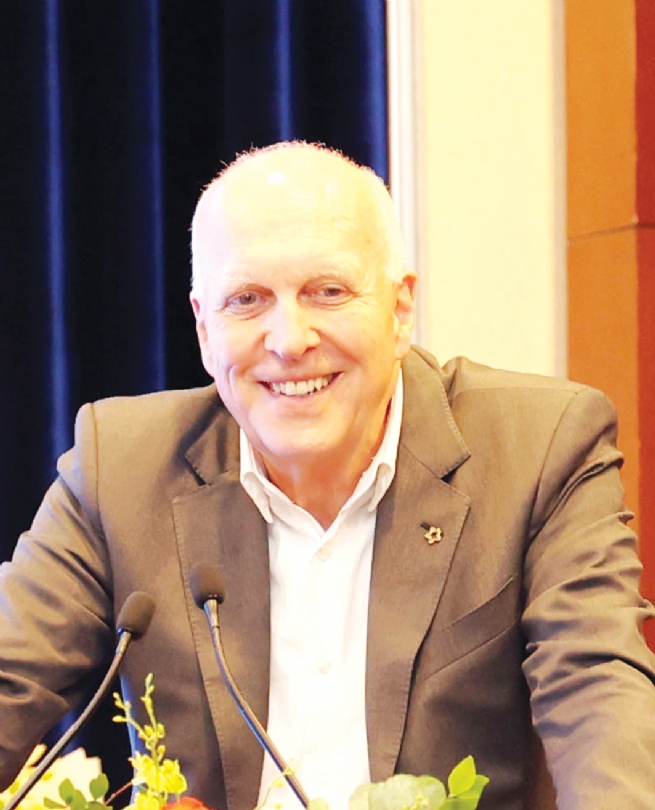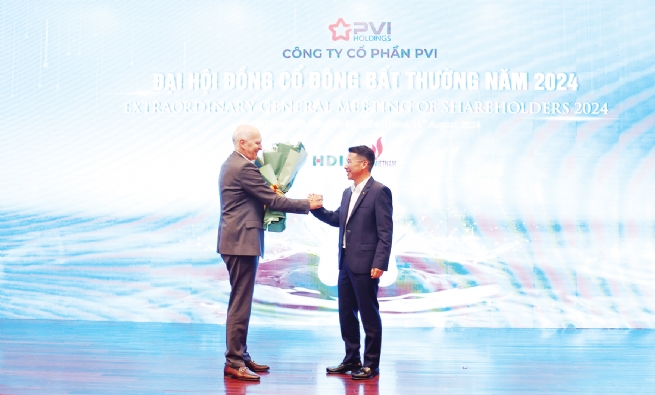With its strategic shareholder HDI Global SE – a member of the Talanx Group, PVI has become a prominent example of deep and effective cooperation between Vietnam and Germany in the financial and insurance sectors. On the occasion of the 50th anniversary of diplomatic relations between Vietnam and Germany (1975–2025), and toward PVI’s 30th anniversary (1996–2026), Enterprise Forum Magazine spoke with Mr. Jens Holger Wohlthat – Chairman of the Board of Directors of PVI Holdings – about PVI's development strategy, the role of its German shareholder, and the outlook for future cooperation between Vietnam and Germany in the modern insurance sector.
 |
As Chairman of a leading non-life financial and insurance enterprise in Vietnam, how do you assess the integration and distinctiveness of the “German factor” in governance, risk management, and business efficiency?
When we talk about the German factor at PVI, we are referring not only to a strategic shareholder, but to a foundational governance philosophy. HDI Global SE – Europe’s leading commercial and industrial insurer – contributes not only financial resources but also a standardized ecosystem for corporate governance, risk control, and operational optimization.
Before HDI’s involvement, PVI was already a strong company. However, partnering with a German strategic investor helped PVI evolve from being “strong” to being “standardized,” shifting from extensive to intensive development. We gradually implemented Solvency II – Europe’s most advanced risk management framework – integrating a transparent, modern valuation, supervision, and reinsurance system. This is particularly important in insurance, where risk management is a core asset.
The German approach is also unique in its philosophy of governance: it is not about restriction but about creating a framework for innovation, creativity, and sustainable growth. It emphasizes discipline, systems thinking, and long-term orientation – all vital in Vietnam’s fast-changing market. The blend of German long-term, precise thinking and Vietnamese dynamism and creativity has forged a unique governance identity and competitive edge. That is why PVI has maintained its leading position in the non-life insurance market and is now pioneering new industry standards in Vietnam.
Currently holding over 20% of the non-life insurance market share and leading in industrial insurance, what is PVI’s strategy to maintain its domestic advantage and expand regionally in a fiercely competitive landscape?
PVI’s strength lies not in size or market share, but in its risk management capabilities, deep understanding of various industries, and its ability to support large corporations with complex, high-risk, tailor-made insurance solutions.
Our strategy to maintain leadership domestically and expand regionally focus on three pillars:
1. Enhancing technical and industrial insurance expertise with support from HDI Global SE. We consistently update international standards like Solvency II and IFRS 17, and advance data analytics, pricing models, and loss assessment technologies.
2. Reframing the corporate customer experience, shifting from product selling to risk lifecycle partnership – identifying, consulting, designing insurance programs, and handling claims. Our “Risk Partner” model helps clients not only operate with peace of mind but also optimize costs and improve risk management.
3. Expanding regional presence with a prudent & proactive approach. PVI is gradually participating in cross-border insurance programs for multinational corporations operating in Vietnam and ASEAN countries, while exploring service networks or technical partnerships in high-potential markets with large industrial insurance demands but limited local capacity.
We do not pursue growth at all costs but focus on sustainable value creation. In a long-term race, customer loyalty is earned not through low prices but through trusted protection – and that is PVI’s commitment.

Mr. Jens Holger Wohlthat, Chairman of the Board of Directors of PVI Holdings, presents flowers to Mr. Nguyen Tuan Tu, the newly appointed General Director
As a German investor familiar with Vietnam’s financial market, how do you view the prospects and obstacles in improving the efficiency of the non-life insurance market? What should “efficiency” mean for the government and businesses moving forward?
Vietnam is one of the fastest-growing insurance markets in the region, thanks to its young population, dynamic economy, and rapid urbanization. However, the non-life sector is still in early stages, with modest GDP contribution, limited coverage, and fragmented products and services.
From a German investor’s perspective, “efficiency” in insurance should be understood as the tight integration of three pillars: professional risk governance, advanced data technology, and streamlined, transparent operations. These form the basis for using every penny of premium wisely to create real value for customers, companies, and the economy.
The major obstacle is the market’s price-driven competition, which neglect the service quality and operational performance. This misleads the market, hinders innovation, and stalls governance improvements. Moreover, the risk assessment and appraisal capacity of many businesses has not kept up with the complexity of the modern industrial economy; especially in the fields of property insurance, energy, maritime or global supply chains.
The Vietnamese government should foster a modern legal framework, encourage international financial safety standards like IFRS 17 and Solvency II, and open up more space for long-term investors with strong reinsurance and tech capabilities. Businesses also need to shift their focus from growth of quantity to quality, and from short-term competition to long-term sustainable foundations.
Over nearly 30 years from establishment, PVI has been through many milestones of growth and restructuring, what core lessons has PVI drawn from its Vietnam-Germany cooperation model?
During the nearly 30-year development journey, especially since the official strategic cooperation with Talanx, PVI has continuously reformed its governance model, professionalized its operating system and upgraded its core values. The three biggest lessons we have learned from the Vietnam-Germany cooperation model to maintain sustainable growth, transparency and strong brand positioning are:
1. Firstly, the discipline and transparency in governance. The German model emphasizes openness in every decision-making process. This has enabled PVI to upgrade governance to international standards, build a culture of deep-rooted risk control, and earn long-term trust from customers and shareholders.
2. Secondly, long-term thinking over short-term gain. Avoiding the lure of immediate growth, we have been persistent in building foundational pillars – personnel quality, management processes, and data systems – for sustainable results. PVI absorbs this mindset to pursue in-depth development over flashy short-term metrics.
3. Thirdly, blending local identity with global standards. PVI’s success isn’t about becoming “fully Germanized,” but about carefully integrating the best of German practices into Vietnam’s practice context. This selective partnership retains our Vietnamese identity while aligning with global trends.
These three factors have helped PVI not only stay resilient but also lead in a rapidly changing market. More importantly, we believe this is a model for other Vietnamese firms to engage meaningfully with foreign partners for long-term & create true value.
From your experience with PVI, what policy recommendations would you offer to attract more high-quality German capital into finance, insurance, and other high-value sectors in Vietnam?
One of the biggest barriers to high-quality German investment – or investment from countries with strict standards, the gap in transparency, governance capacity, and long-term stability of the investment environment.
Based on our long-standing, effective partnership with Talanx/HDI Global SE, we understand that German investors do not just pursue quick profits. They prioritize standardization, transparency, and long-term risk control. Therefore, What Vietnam needs is not just tax incentives or favorable procedures, but a synchronous institutional ecosystem; commitments on corporate governance according to good standards & practices, minority shareholder rights, and sustainable development orientation are institutionalized and consistently implemented.
One specific policy recommendation would be the establishment of “high-quality investment sandboxes”, or “policy pilot zones”, where the government can test investment standards aligned with the EU – including ESG criteria, financial transparency, foreign investor protection, and risk governance. Domestic firms meeting these standards and participating in these zones would become trusted destinations for German investors. This policy doesn’t offer privileges – it fosters trust, which is the most valuable currency for high-quality capital.
From my experience operating in many international markets and especially through my time with PVI, I believe that if Vietnam approaches its investment policy not only from the perspective of attraction, but also from the internal need to improve the quality of enterprises, then the attraction to German investors will come naturally, sustainably and with real added value.
Thank you very much!